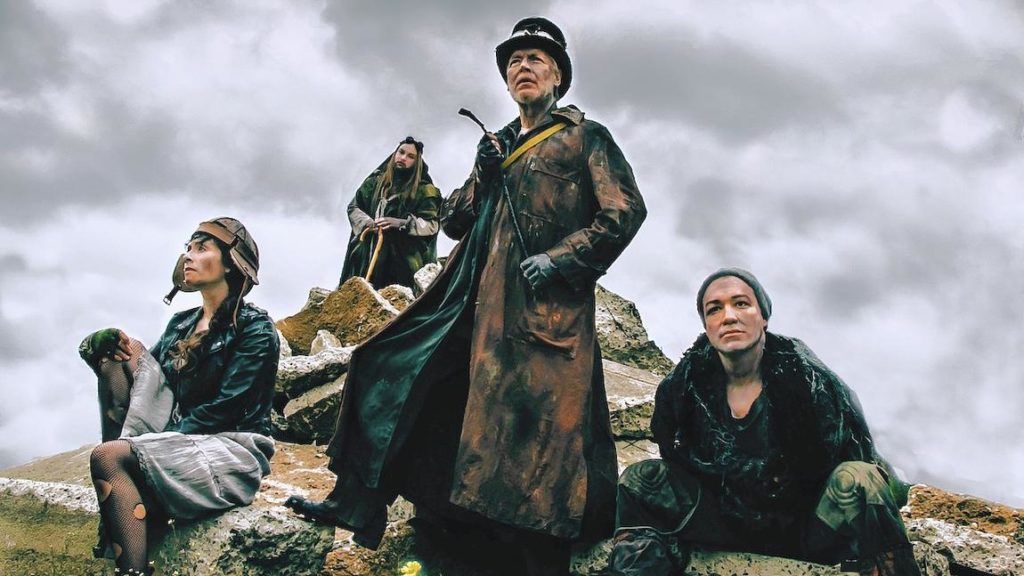 by Christopher Arnott
by Christopher Arnott
view article on Courant.com
 “The Roar of the Greasepaint — The Smell of the Crowd.”
“The Roar of the Greasepaint — The Smell of the Crowd.”
The very title of this 1964 cult musical by Anthony Newley and Leslie Bricusse would seem to disparage theater audiences. But director Don Stephenson, who’s pushed through a rare revival of the show, has the utmost respect for its intentions, and especially for its songs.
The new production, which Goodspeed Musicals is presenting at its Norma Terris Theatre through June 26, has been extensively restructured. Its cast has been stripped down to a mere quartet, with no chorus ensemble and just six musicians in the orchestra. There’s a completely different environmental framework.
But Stephenson maintains that those who treasure the show based on its original Broadway cast album will not be disappointed.
“The thing that drew me were the songs,” the director said in a phone interview earlier this month. “Amazing, glorious songs that rip your heart out. When I spoke to [the famed lyricist] Leslie Briscusse, he said, ‘The songs from this show have had a good life, but not in the show.'”
One of them, “The Joker,” was a pop hit for Bobby Rydell, while Dusty Springfield put “Who Can I Turn To (When Nobody Needs Me)” on her album “Everything’s Coming Up Dusty.” “Feeling Good” — a song of freedom sung by a character originally called “The Negro” and reinvented for this production as “The Stranger,” has been recorded by everyone from Nina Simone to John Coltrane to Muse to the Pussycat Dolls.
Assured that he had a sensational score to work with, Stephenson turned his attention to the musical’s book.
“It was originally written as an allegory of the British class system, with an upper-class guy named Sir, a lower-class guy named Cocky and eight to 10 ‘urchins’ dressed in all the colors of the rainbow. I thought, ‘Well, that’s all well and good, but allegory will only get you so far.’ I thought it needed a real time and place, with its own special circumstances.”
The Norma Terris production is essentially a workshop, not open to critics, so that Stephenson and the cast can experiment with all their new ideas for the show.
Stephenson has taken the lines and songs from the urchins and redistributed them to the main four characters, primarily the one known as “The Kid.”
He’s also added some changes “to make it more American.” The setting of the original was on the stage of British Musical Hall. The scene now is a barren post-apocalyptic landscape.
Since Stephenson has kept the show’s original concept of having the characters playing literal power games (with Sir continually changing the rules so that he might win), putting a survivalist spin on the story “was a way I could solve all the problems with the book,” Stephenson says. “Before it was abstract: playing the game of life. In this context, it’s a game of staying alive.
“You know something has happened — something environmental, or man-made, or a war, it doesn’t matter. These characters are just trying to make a go of it. The idea of the class system is still in play, since Sir has all of the stuff that the others need.
“This show was ahead of its time, taking on racism, the haves and the have-nots. I wanted to take on these issues and more. This show is about everything: love, romance, betrayal, sadness, lying …”
To go with the new emotional feel of the show, Stephenson also promises “all new orchestrations. The original score sounds right out of the ’60s — remember, Leslie wrote the song ‘Goldfinger.’ This is going to sound completely different — like Kurt Cobain unplugged. Really emotional and engaging, like a single wailing violin.”
As for the cast, Stephenson enlisted an old friend and occasional collaborator, Tony Sheldon, to be Sir.
“He’s a wonderful comedian and dancer, and he can bring some menace, an unpredictability.”
Cocky is played by Caesar Samayoa, The Kid is Michelle Aravena and The Stranger is Gregory Treco.
Tony Sheldon, reached by phone during a lunch break, says he’s done “Roar of the Greasepaint” before, in his native Australia.
“Believe it or not, I played The Negro,” he said. “They symbolically blacked me up. I’ve also sung ‘Things to Remember’ in cabaret over the years. I love it, just because it’s so silly.”
To play Sir at Goodspeed, the actor — who played Horace Vandergelder in the 2013 Goodspeed production of “Hello, Dolly!” and is best known from his international success as Bernadette in the musical version of “Priscilla, Queen of the Desert” — at first was “swanning in my best British accent. On the second day of rehearsals I realized that the script had in fact been rewritten. The references to the British political system had been changed to the American system. I couldn’t play Sir as this Dickensian figure anymore.”
Sheldon now sports an American accent in the show.
“Sir doesn’t like change, He doesn’t like how the world has modernized, the way people have rights.” In that respect, he calls the show “very prescient.” “This is a very worthy experiment. We’ve living in an era of fear at the moment. Everyone’s frightened. It’s interesting that a lot of our pop culture stuff now is ‘Mad Max’ or ‘The Walking Dead.'”
Sheldon describes “The Roar of the Greasepaint, The Smell of a Crowd” as “still fun. Just different fun. It’s about people keeping each other alive and keeping each other entertained.”

Comments are closed.